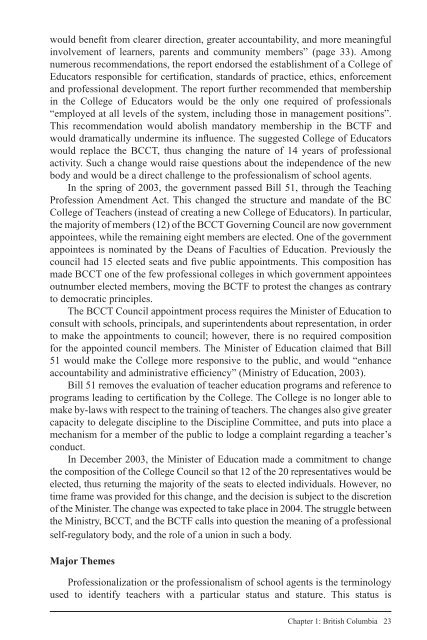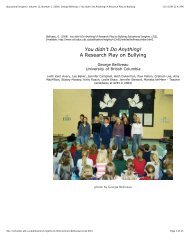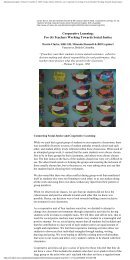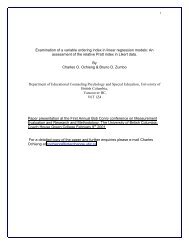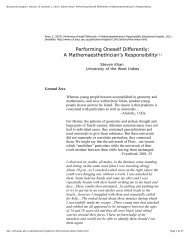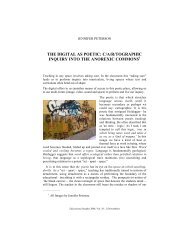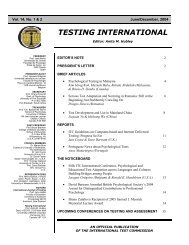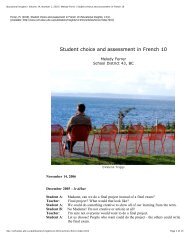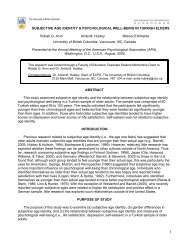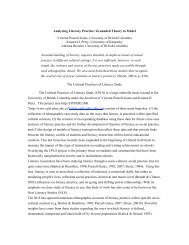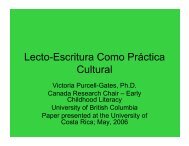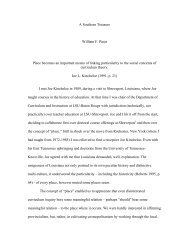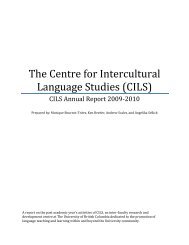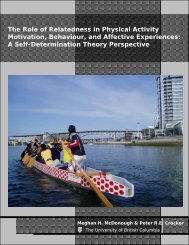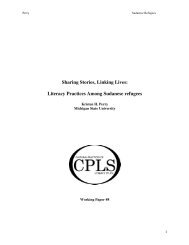The evolution of professionalism - Centre for Policy Studies in ...
The evolution of professionalism - Centre for Policy Studies in ...
The evolution of professionalism - Centre for Policy Studies in ...
You also want an ePaper? Increase the reach of your titles
YUMPU automatically turns print PDFs into web optimized ePapers that Google loves.
would benefi t from clearer direction, greater accountability, and more mean<strong>in</strong>gful<br />
<strong>in</strong>volvement <strong>of</strong> learners, parents and community members” (page 33). Among<br />
numerous recommendations, the report endorsed the establishment <strong>of</strong> a College <strong>of</strong><br />
Educators responsible <strong>for</strong> certifi cation, standards <strong>of</strong> practice, ethics, en<strong>for</strong>cement<br />
and pr<strong>of</strong>essional development. <strong>The</strong> report further recommended that membership<br />
<strong>in</strong> the College <strong>of</strong> Educators would be the only one required <strong>of</strong> pr<strong>of</strong>essionals<br />
“employed at all levels <strong>of</strong> the system, <strong>in</strong>clud<strong>in</strong>g those <strong>in</strong> management positions”.<br />
This recommendation would abolish mandatory membership <strong>in</strong> the BCTF and<br />
would dramatically underm<strong>in</strong>e its <strong>in</strong>fl uence. <strong>The</strong> suggested College <strong>of</strong> Educators<br />
would replace the BCCT, thus chang<strong>in</strong>g the nature <strong>of</strong> 14 years <strong>of</strong> pr<strong>of</strong>essional<br />
activity. Such a change would raise questions about the <strong>in</strong>dependence <strong>of</strong> the new<br />
body and would be a direct challenge to the pr<strong>of</strong>essionalism <strong>of</strong> school agents.<br />
In the spr<strong>in</strong>g <strong>of</strong> 2003, the government passed Bill 51, through the Teach<strong>in</strong>g<br />
Pr<strong>of</strong>ession Amendment Act. This changed the structure and mandate <strong>of</strong> the BC<br />
College <strong>of</strong> Teachers (<strong>in</strong>stead <strong>of</strong> creat<strong>in</strong>g a new College <strong>of</strong> Educators). In particular,<br />
the majority <strong>of</strong> members (12) <strong>of</strong> the BCCT Govern<strong>in</strong>g Council are now government<br />
appo<strong>in</strong>tees, while the rema<strong>in</strong><strong>in</strong>g eight members are elected. One <strong>of</strong> the government<br />
appo<strong>in</strong>tees is nom<strong>in</strong>ated by the Deans <strong>of</strong> Faculties <strong>of</strong> Education. Previously the<br />
council had 15 elected seats and fi ve public appo<strong>in</strong>tments. This composition has<br />
made BCCT one <strong>of</strong> the few pr<strong>of</strong>essional colleges <strong>in</strong> which government appo<strong>in</strong>tees<br />
outnumber elected members, mov<strong>in</strong>g the BCTF to protest the changes as contrary<br />
to democratic pr<strong>in</strong>ciples.<br />
<strong>The</strong> BCCT Council appo<strong>in</strong>tment process requires the M<strong>in</strong>ister <strong>of</strong> Education to<br />
consult with schools, pr<strong>in</strong>cipals, and super<strong>in</strong>tendents about representation, <strong>in</strong> order<br />
to make the appo<strong>in</strong>tments to council; however, there is no required composition<br />
<strong>for</strong> the appo<strong>in</strong>ted council members. <strong>The</strong> M<strong>in</strong>ister <strong>of</strong> Education claimed that Bill<br />
51 would make the College more responsive to the public, and would “enhance<br />
accountability and adm<strong>in</strong>istrative effi ciency” (M<strong>in</strong>istry <strong>of</strong> Education, 2003).<br />
Bill 51 removes the evaluation <strong>of</strong> teacher education programs and reference to<br />
programs lead<strong>in</strong>g to certifi cation by the College. <strong>The</strong> College is no longer able to<br />
make by-laws with respect to the tra<strong>in</strong><strong>in</strong>g <strong>of</strong> teachers. <strong>The</strong> changes also give greater<br />
capacity to delegate discipl<strong>in</strong>e to the Discipl<strong>in</strong>e Committee, and puts <strong>in</strong>to place a<br />
mechanism <strong>for</strong> a member <strong>of</strong> the public to lodge a compla<strong>in</strong>t regard<strong>in</strong>g a teacher’s<br />
conduct.<br />
In December 2003, the M<strong>in</strong>ister <strong>of</strong> Education made a commitment to change<br />
the composition <strong>of</strong> the College Council so that 12 <strong>of</strong> the 20 representatives would be<br />
elected, thus return<strong>in</strong>g the majority <strong>of</strong> the seats to elected <strong>in</strong>dividuals. However, no<br />
time frame was provided <strong>for</strong> this change, and the decision is subject to the discretion<br />
<strong>of</strong> the M<strong>in</strong>ister. <strong>The</strong> change was expected to take place <strong>in</strong> 2004. <strong>The</strong> struggle between<br />
the M<strong>in</strong>istry, BCCT, and the BCTF calls <strong>in</strong>to question the mean<strong>in</strong>g <strong>of</strong> a pr<strong>of</strong>essional<br />
self-regulatory body, and the role <strong>of</strong> a union <strong>in</strong> such a body.<br />
Major <strong>The</strong>mes<br />
Pr<strong>of</strong>essionalization or the pr<strong>of</strong>essionalism <strong>of</strong> school agents is the term<strong>in</strong>ology<br />
used to identify teachers with a particular status and stature. This status is<br />
Chapter 1: British Columbia 23


